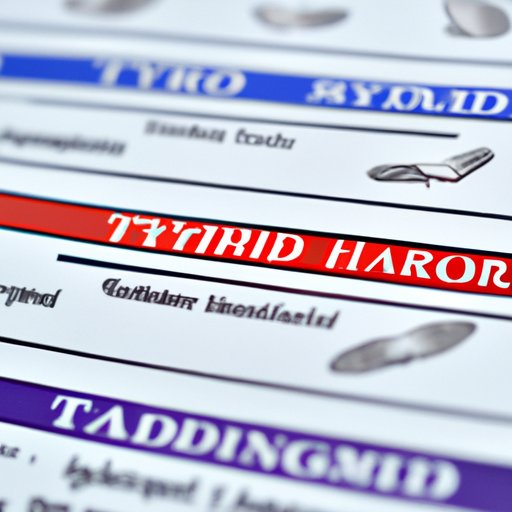
Is Thyroid Disease Hereditary?
Thyroid disease is a condition that affects the thyroid gland, a small butterfly-shaped gland located in the neck that produces hormones that regulate the body’s metabolism. The thyroid gland produces two types of hormones, triiodothyronine (T3) and thyroxine (T4), which are essential in maintaining a healthy body weight, heart rate, and energy levels.
Thyroid disease is a common health condition that affects around 20 million people in the United States alone. Understanding the causes and risk factors of thyroid disease is crucial in managing and treating the condition effectively.
The Genetics of Thyroid Disease: Understanding How Your Family History Can Impact Your Health
Several factors can contribute to the development of thyroid disease, including age, lifestyle, and environmental factors. However, studies suggest that family history can be a critical risk factor for thyroid disease.
If a family member has a history of thyroid disease, you may have an increased risk of developing the condition. According to the American Thyroid Association, individuals with a close family member with thyroid disease are five to ten times more likely to develop the condition.
It is crucial to talk to your family members about their medical history, especially concerning thyroid disease. Knowing your family’s medical history can help you and your healthcare provider understand your risk for the condition.
It is important to be aware that age is also a factor in the development of thyroid disease. It is more common in older adults, especially women over the age of 60. Age and family history, combined with environmental factors, can increase the risk for thyroid disease.
Nature vs. Nurture: Debating the Role of Genetics in Thyroid Disease
While family history plays a significant role in thyroid disease, there is still a debate surrounding the role of genetics in the development of the condition.
Several studies suggest that environmental factors, such as diet, stress, and exposure to radiation, can trigger thyroid disease development. However, research also indicates that genetic components contribute significantly to the risk of developing thyroid disease.
To understand the role of genetics in thyroid disease, it is essential to distinguish between genes and chromosomes. Genes are the units of inheritance that transmit traits from parent to offspring. Chromosomes, on the other hand, are the structures that contain genes.
When Genes are the Culprit: Exploring the Inheritance Patterns of Thyroid Disease
Thyroid disease can be passed down from parents to their offspring through inheritance patterns. Different types of thyroid disease have different inheritance patterns. Understanding the inheritance patterns can help individuals understand their risk and severity of thyroid disease.
The most common types of thyroid disease are Graves’ disease, Hashimoto’s thyroiditis, and thyroid cancer. Graves’ disease is an autoimmune disorder, meaning the immune system mistakenly attacks the thyroid gland, leading to hyperthyroidism. Hashimoto’s thyroiditis is also an autoimmune disorder that causes hypothyroidism as the immune system attacks the thyroid gland. Thyroid cancer can be hereditary, with families having an increased risk of developing the condition.
Studies have shown that the risk of inheriting thyroid disease varies depending on the type of thyroid disease, with some conditions having higher inheritance probability than others. For instance, if a parent has Graves’ disease, the child has a 20% chance of developing the condition. On the other hand, if a child’s parent has Hashimoto’s thyroiditis, the child has a 5% chance of developing the condition.
It is essential to note that inheriting a genetic tendency does not necessarily guarantee the development of thyroid disease. Several other factors can trigger or contribute to thyroid disease development, such as environmental and lifestyle factors.
Breaking Down the Science: How Chromosomes and DNA Influence Thyroid Health
Chromosomes and DNA play a critical role in thyroid hormone synthesis, an intricate process that takes place in the thyroid gland. Thyroid hormone synthesis involves the conversion of the amino acid tyrosine into T3 and T4 hormones with the help of iodine.
DNA provides the instructions for the synthesis of thyroid hormone by encoding the proteins responsible for the hormone’s production. An abnormality in the DNA sequence can affect the production of thyroid hormone and lead to thyroid disease.
Chromosomes also play a role in thyroid health. An extra chromosome or a missing chromosome can cause thyroid problems. For instance, individuals with Down syndrome have an increased risk of developing thyroid disease because they have an extra chromosome.
Predicting Risk: Using Genetic Testing to Determine Your Likelihood of Developing Thyroid Disease
Genetic testing can help individuals determine their risk of developing thyroid disease. However, genetic testing is not a routine diagnostic tool for thyroid disease, and it is not frequently recommended unless there is a strong family history of the condition.
Genetic testing is useful in identifying genetic abnormalities that may cause thyroid disease. The testing can help healthcare providers determine the severity of the condition, the risk of developing thyroid cancer, and the appropriate treatment plan.
Before deciding to undergo genetic testing, it is necessary to consider the pros and cons. Genetic testing can provide valuable information that can help individuals manage their health. However, it can also cause increased anxiety, uncomfortable medical procedures, and potential discrimination by health insurance companies.
Conclusion
Thyroid disease is a prevalent condition that can be caused by various factors, including family history, lifestyle, and environmental factors. Understanding the role of genetics in thyroid disease is crucial in managing and treating the condition effectively.
While genetics may play a significant role in thyroid disease development, several other factors contribute to the condition’s development. Living a healthy lifestyle, managing stress, and limiting exposure to environmental toxins can help manage and reduce the risk of developing thyroid disease.
Individuals with a family history of thyroid disease should speak with their healthcare provider to understand their risk and develop a personalized preventive plan. Early detection and proper medical care can help manage thyroid disease and prevent complications.





